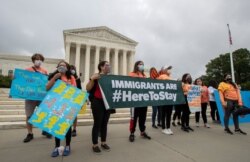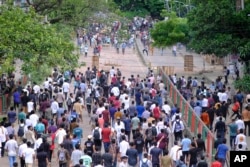Student Union
Federal Aid Offered to Some International Students
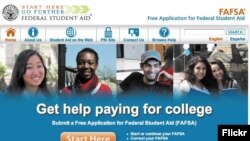
International students are not often eligible for federal student aid, and typically pay full tuition and fees for their college and university education that can cost more than $100,000 a year.
“The fact that I most likely will not be able to go to university because only two of the ones I’m applying to offer financial aid to international students and I can’t afford to go otherwise, literally kills me, like it’s breaking my heart,” tweeted Isabella Romanov, a British citizen who told VOA she plans to study in the U.S.
But there are exceptions.
International students who are not citizens but fall into eligibility categories may apply for federal financial aid, according to Federal Student Aid (FSA).
The categories include:
Students who are a U.S. national — including natives of American Samoa and Swains Island — or a U.S. permanent resident — commonly referred to as a green card holder. A U.S. national is defined by the U.S. Department of Homeland Security as “a person owing permanent allegiance to a state.” U.S. permanent residents “are non-citizens who are lawfully authorized to live permanently within the United States.”
If they have an Arrival-Departure Record (I-94) from U.S. Citizen and Immigration Services (USCIS), showing their status as “refugee,” “asylum granted,” “Cuban Haitian entrant,” “conditional entrant” or “parolee.” To qualify as a parolee, students “must be able to provide evidence from the USCIS that you are in the United States for other than a temporary purpose with the intention of becoming a U.S. citizen or permanent resident,” and must be paroled for at least one year.
If a student or their parents holds a T-1 nonimmigrant status visa, granted to victims of human trafficking. The college or career center’s financial aid office will ask for a copy of the visa and/or certification letter from the U.S. Department of Health and Human Services.
If students are a “battered immigrant-qualified alien,” meaning that they are a victim of abuse by their U.S. citizen or permanent resident spouse, or “are the child of a person designated as such under the Violence Against Women Act (VAWA).”
Students from the Republic of Palau “are eligible for Federal Pell Grants, Federal Supplemental Educational Opportunity Grants, and Federal Work-Study,” while those from the Federated States of Micronesia and the Republic of the Marshall Islands are only eligible for Pell grants. Pell grants are not loans and do not need to be repaid.
The website explains that, “To qualify for federal student aid, certain eligible noncitizens must be able to provide evidence from the USCIS that they are in the United States for other than a temporary purpose with the intention of becoming a U.S. citizen or permanent resident.”
However, undocumented students, and students who have been granted Deferred Action for Childhood Arrivals (DACA), are not eligible for any type of federal aid — though they may be eligible for aid from their university of the state in which they live.
In some cases, DACA recipients may be asked to complete a Free Application for Federal Student Aid (FAFSA) to receive aid from their institution or their state of residence. FAFSA is an official federal application for all eligible students to apply for financial aid — like grants and loans — from the U.S. government.
A parent’s citizenship or immigration status will not affect a student’s eligibility for financial aid.
If a student’s permanent residence status has expired, they are no longer eligible for federal student aid. Students whose green cards have expired are encouraged to check their status as a legal permanent resident and if they are able to renew the card, if necessary.
That being said, if they are a Cuban Haitian entrant, they are still an eligible noncitizen, even if the expiration date has passed.
Students are not considered eligible non-citizens and not eligible to receive federal student aid if they:
Are studying in the U.S. on an F-1 or F-2 nonimmigrant student visa, or on a J-1 or J-2 nonimmigrant Exchange Visitor Visa. According to the U.S. State Department’s EducationUSA — a U.S. Department of State network of more than 430 international student advising centers around the world — the F-1 visa is used for those who wish to study at an accredited college or university, or to study English at an English language institution, while F-2 is the visa for the spouses and children of those who use the F-1 visa.
The J-1 visa is used for participation in a high school or university exchange program. Like the F-2 visa, the J-2 visa is for the spouses and children of J-1 visa holders.
Hold a G series visa. To have a G visa, “you must be traveling to attend meetings at, visit, or work at a designated international organization,” according to the U.S. Department of State.
Have been given a “Notice of Approval to Apply for Permanent Residence” (I-171 or I-464).
For those who may not qualify for federal student aid, there are still ways to help fund their education, like scholarships and private loans. The Federal Student Aid (FSA) website encourages students to check out the U.S. Department of Labor’s online scholarship search, as well as EducationUSA.
An international student’s college or own government — including the country’s embassy or consulate in the U.S. — may provide funding resources for study in the U.S.
About 60% of international students pay for their U.S. college or university education through self or family funding. Some receive funding from their native governments, the U.S. university they attend, or private loans and grants.
See all News Updates of the Day
Tips for first-year international students in the US
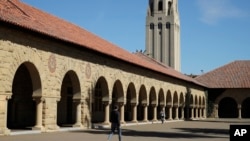
Book your flights right away, get a U.S. phone plan, make sure you have linens for your dorm and attend orientation – that’s some of the advice international students have for first-year college students coming from abroad.
U.S. News & World Report compiled helpful tips for students studying in the United States for the first time. (July 2024)
Survey: Social integration, career prep are important to international students
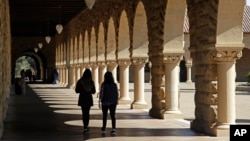
A recent survey of international students in the United States found that before starting school, they were concerned about personal safety, making friends and feeling homesick.
Inside Higher Ed reports that international students want specialized orientations, peer connections, career preparation and job placement to help make their college experiences successful. (July 2024)
US advisory council ends Nigeria visit, signs student exchange deal
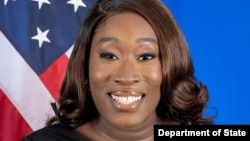
Members of a U.S. presidential advisory council have approved a student exchange deal between an American college and a Nigerian university as part of the council's effort to strengthen collaboration on education, health, entrepreneurship and development between Africa and Africans living abroad.
The council also visited a health facility supported by the United States Agency for International Development in the capital.
Nigerian authorities and visitors chatted with members of the U.S President's Advisory Council on African Diaspora Engagement as they toured a healthcare facility in Karu, a suburb of Abuja, on the last day of the council's three-day visit to Abuja and Lagos.
The facility is one of many supported by the United States Agency for International Development, or USAID, to improve the management of childhood illnesses, family planning, immunization and delivery.
The tour was part of the council's effort to promote African diaspora-led investments in technology entrepreneurship, education and healthcare delivery.
"They're doing a phenomenal job there, it really gave us a sense of what the healthcare system is in Nigeria," said Deniece Laurent-Mantey, executive director of the advisory council. "This is our first trip as a council to the continent and we chose Nigeria for a reason — the diaspora in Nigeria is very active, very influential, and they're really a source of strength when it comes to our U.S.-Africa policy. And so for us coming to Nigeria was very intentional."
The council was created by President Joe Biden in September to improve collaboration between Africa and its diaspora in terms of economic and social development.
Akila Udoji, manager of the Primary Healthcare Centre of Karu, said officials in Nigeria were pleased that the council members were able to visit.
"We're happy that they have seen what the money they have given to us to work with has been used to do, because they have been able to assist us in capacity-building, trainings, equipment supply and the makeover of the facility," Udoji said.
Earlier, the council signed a deal for a student exchange program between Spelman College in the southern U.S. city of Atlanta and Nigeria's University of Lagos.
Laurent-Mantey said education exchanges are one of the council's top priorities.
"In Lagos, we had the president of Spelman College — she's also a member of our council — she signed an agreement with the University of Lagos to further education exchange programs in STEM and creative industries between those two universities," Laurent-Mantey said. "And I think for us it's very important, because Spelman College is a historically Black university, and so here we are promoting the importance of collaboration between African Americans and Africans."
In March, the advisory council adopted its first set of recommendations for the U.S. president, including the student exchange initiative, advocating for more U.S. government support for Africa, climate-focused initiatives, and improving U.S. visa access for Africans.
The council met with Nigerian health and foreign affairs officials during the visit before leaving the country on Wednesday.
American Academy of the Arts College announces closure
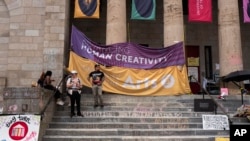
The American Academy of Art College in Chicago announced it would be closing after 101 years of preparing students for careers in art and illustration.
WTTW news reported that like other art colleges, the academy saw enrollment drop after the pandemic, and officials made the decision to close the college last month. (July 2024)
5 killed, dozens injured in clashes over Bangladesh jobs quota system
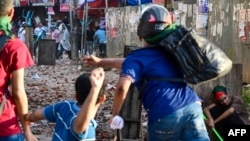
At least 5 people were killed and dozens injured in two separate incidents in Bangladesh as violence continued Tuesday on university campuses in the nation's capital and elsewhere over a government jobs quota system, local media reports said quoting officials.
At least three of the dead were students and one was a pedestrian, the media reports said. Another man who died in Dhaka remained unidentified.
The deaths were reported Tuesday after overnight violence at a public university near Bangladesh's capital, Dhaka. The violence involved members of a pro-government student body and other students, when police fired tear gas and charged the protesters with batons during the clashes, which spread at Jahangir Nagar University in Savar, outside Dhaka, according to students and authorities.
Protesters have been demanding an end to a quota reserved for family members of veterans who fought in Bangladesh's war of independence in 1971, which allows them to take up 30% of governmental jobs.
They argue that quota appointments are discriminatory and should be merit-based. Some said the current system benefits groups supporting Prime Minister Sheikh Hasina. Some Cabinet ministers criticized the protesters, saying they played on students' emotions.
The Bengali-language Prothom Alo daily newspaper reported that one person died in Dhaka and three others, including a pedestrian, were killed after they suffered injuries during violence in Chattogram, a southeastern district, on Tuesday.
Prothom Alo and other media reports also said that a 22-year-old protester died in the northern district of Rangpur.
Details of the casualties could not be confirmed immediately.
While job opportunities have expanded in Bangladesh's private sector, many find government jobs stable and lucrative. Each year, some 3,000 such jobs open up to nearly 400,000 graduates.
Hasina said Tuesday that war veterans — commonly known as "freedom fighters" — should receive the highest respect for their sacrifice in 1971 regardless of their current political ideologies.
"Abandoning the dream of their own life, leaving behind their families, parents and everything, they joined the war with whatever they had," she said during an event at her office in Dhaka.
Protesters gathered in front of the university's official residence of the vice chancellor early Tuesday when violence broke out. Demonstrators accused the Bangladesh Chhatra League, a student wing of Hasina's ruling Awami League party, of attacking their "peaceful protests." According to local media reports, police and the ruling party-backed student wing attacked the protesters.
But Abdullahil Kafi, a senior police official, told the country's leading English-language newspaper Daily Star that they fired tear gas and "blank rounds" as protesters attacked the police. He said up to 15 police officers were injured.
More than 50 people were treated at Enam Medical College Hospital near Jahangir Nagar University as the violence continued for hours, said Ali Bin Solaiman, a medical officer of the hospital. He said at least 30 of them suffered pellet wounds.
On Monday, violence also spread at Dhaka University, the country's leading public university, as clashes gripped the campus in the capital. More than 100 students were injured in the clashes, police said.
On Tuesday, protesters blocked railways and some highways across the country, and in Dhaka, they halted traffic in many areas as they vowed to continue demonstrating until the demands were met.
Local media said police forces were spread across the capital to safeguard the peace.
Swapon, a protester and student at Dhaka University who gave only his first name, said they want the "rational reformation of the quota scheme." He said that after studying for six years, if he can't find a job, "it will cause me and my family to suffer."
Protesters say they are apolitical, but leaders of the ruling parties accused the opposition of using the demonstrations for political gains.
A ruling party-backed student activist, who refused to give his name, told The Associated Press that the protesters with the help of "goons" of the opposition's Bangladesh Nationalist Party and Jamaat-e-Islami party vandalized their rooms at the student dormitories near the Curzon Hall of Dhaka University.
The family-of-the-veterans quota system was halted following a court order after mass student protests in 2018. But last month, Bangladesh's High Court nulled the decision to reinstate the system once more, angering scores of students and triggering protests.
Last week, the Supreme Court suspended the High Court's order for four weeks and the chief justice asked protesting students to return to their classes, saying the court would issue a decision in four weeks.
However, the protests have continued daily, halting traffic in Dhaka.
The quota system also reserves government jobs for women, disabled people and ethnic minority groups, but students have protested against only the veterans system.
Hasina maintained power in an election in January that was again boycotted by the country's main opposition party and its allies due to Hasina's refusal to step down and hand over power to a caretaker government to oversee the election.
Her party favors keeping the quota for the families of the 1971 war heroes after her Awami League party, under the leadership of her father, Sheikh Mujibur Rahman, led the independence war with the help of India. Rahman was assassinated along with most of his family members in a military coup in 1975.




